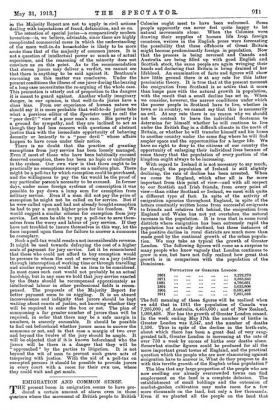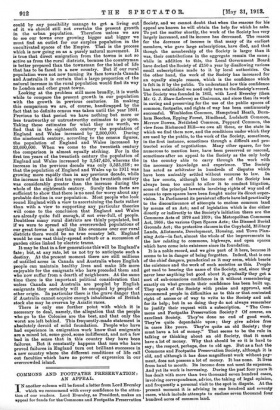EMIGRATION AND COMMON SENSE. THE present boom in emigration seems
to have pro- duced a certain amount of alarm even in those quarters where the movement of British people to British Colonies ought most to have been welcomed. Some people apparently can never feel quite happy to let natural movements alone. When the Colonies were drawing their supplies of human life from foreign countries, writers in the English press were forecasting the possibility that these offshoots of Great Britain might become predominantly foreign in population. Now that the process is being reversed and Canada and Australia are being filled up with good English and Scottish stock, the same people are again wringing their hands and declaring that Britain is being drained of her lifeblood. An examination of facts and figures will show how little ground there is at any rate for this latter pessimistic theory. It is true that at the present moment the emigration from Scotland is so active that it more than keeps pace with the natural growth in population, with the result that a small decline has set in. When we consider, however, the narrow conditions under which the poorer people in Scotland have to live, whether in town or in country, we cannot say that this is necessarily an evil. At any rate there is no reason why we should not be content to leave the individual Scotsman to determine for himself whether he will continue to live under the British flag in a difficult climate in the north of Britain, or whether he will transfer himself and his home to another country under the same flag where he will find. ampler space and the opportunities for a larger life. We have no right to deny to the citizens of our country the opportunity of enlarging their individual lives because of some theory that the population of every portion of the kingdom ought always to be increasing.
With regard to Ireland it is not necessary to say much, for though the population of Ireland is still slightly declining, the rate of decline has been arrested. When we come to England, which after all is far more important from this point of view—and with all respect to our Scottish and Irish friends, from every point of view•—than either Scotland or Ireland, we meet with quite a different type of fact. In spite of the activity of emigration agencies throughout England, in spite of the letters constantly written home from successful emigrants to friends and relatives left behind, the emigration from England and Wales has not yet overtaken the natural increase in the population. It is true that in some rural districts where emigration has been extremely rapid the population has actually declined, but these instances of the positive decline in rural districts are much more than made good by the continual growth of the urban popula- tion. We may take as typical the growth of Greater London. The following figures will come as a surprise to many people who know vaguely that London continues to grow in size, but have not fully realized how great that growth is in comparison with the population of the Dominions.
POPULATION OF GREATER LONDON.
1861 ... ... 3,222,270 1871 ... 3,885,641 1881 ... 4,766,661 1891 ... .., 5,633,806 1901 ... ... ... ... 6,581,402 1911 ... 7,251,358
The full meaning of these figures will be realized when we add that in 1911 the population of Canada was 7,205,000 ; of Australia, 4,455,000 ; and of New Zealand, 1,008,468. Nor has the growth of Greater London ceased. In the week ending May 17th the number of births in Greater London was 2,347, and the number of deaths 1,596. Thus in spite of the decline in the birth-rate, about which there has been a great deal of very exag- gerated talk, Greater London is increasing at the rate of over 750 a week by excess of births over deaths alone. Somewhat similar figures could be produced for all the more important great towns of England, and the practical question which the people who are now clamouring against emigration have to answer is, What do they propose to do with this terrific growth of the English urban population ?
The idea that any large proportion of the people who are now swelling our already overcrowded towns can find employment on the land is a complete delusion. The establishment of small holdings and the extension of market-garden cultivation may make room for a few more thousands on the land, but only a few thousands. Even if we planted all the people on the land that could by any possibility manage to get a living out of it we should still not overtake the present growth in the urban population. Therefore unless we are to see our towns ever growing bigger and bigger we must find an outlet for our surplus population in the uncultivated spaces of the Empire. That is the process which is now going on as a purely natural movement. It is true that direct emigration from the towns is not so active as from the rural districts, because the countryman is better prepared than the townsman for the kind of life that has to be faced in a new country. But if our rural population were not now turning its face towards Canada and Australia it is certain that a large proportion of the natural increase in the rural population would find its way to London and other great towns. Looking at the problem still more broadly, it is worth while to compare the present growth in our population with the growth in previous centuries. In making this comparison we are, of course, handicapped by the fact that no definite census was taken until the year 1801. Previous to that period we have nothing but more or less trustworthy or untrustworthy estimates to go upon. Taking these estimates for what they are worth, we find that in the eighteenth century the population of England and Wales increased by 2,800,000. During the nineteenth century, according to the census figures, the population of England and Wales increased by 23,600,000. When we come to the twentieth century the comparison is almost equally striking. For in the first ten years of the twentieth century the population of England and Wales increased by 3,547,426, whereas the increase in the previous decade was only 3,525,218; so that the population of England and Wales up to 1911 was growing more rapidly than in any previous decade, while the increase in the first ten years of the twentieth century was considerably greater than the increase during the whole of the eighteenth century. Surely these facts are sufficient to show that there is no need for worry about any probable decline in our population. Most people who look round England with a view to ascertaining the facts rather than with a view to supporting any particular theories will come to the conclusion that England and Wales are already quite full enough, if not over-full, of people.
Doubtless many rural districts are thinly populated, but if we were to spread all the overcrowded populations of our great towns in anything like evenness over our rural districts there would be no true country left. England would be one vast thinly-spread suburb or a succession of garden cities linked by electric trams.
It may be that in a few generations this will be England's fate ; but, at any rate, let us not try to anticipate such a destiny. At the present moment there are still millions of untilled acres in Canada and Australia where English people can maintain healthy lives and make life more enjoyable for the emigrants who have preceded them and who now suffer from a dearth of neighbours. At the same time there is the important political consideration that unless Canada and Australia are peopled by English emigrants they certainly will be occupied by peoples of other origin. In particular there is the grave danger that if Australia cannot acquire enough inhabitants of British stock she may be overrun by Asiatic races.
There is only one further point with which it is necessary to deal, namely, the allegation that the people who go to the Colonies are the best, and that only the worst are left behind. This frequently-made statement is absolutely devoid of solid foundation. People who have had experience in emigration work know that emigrants are a mixed lot, some good, some indifferent, and not a few bad in the sense that in this country they have been failures. But it constantly happens that men who have proved failures in England turn out brilliant successes in a new country where the different conditions of life call out faculties which have no power of expression in our overcrowded island.



















































 Previous page
Previous page